Life and Works of Athanasius the Great (7 vols.)
Digital Logos Edition
Overview
Athanasius of Alexandria stands as a pillar of the Christian faith—a hero of Christianity during a time of widespread heresy and political fear. From a time even before Arianism spread until the end of his days, Athanasius fought tooth-and-nail to preserve the teachings of the Trinity and the Incarnation. As Arianism grew, he found himself among a minority of those defending these doctrines, causing him to be publicly anathematized in his own hometown and exiled on six separate occasions.
Athanasius’ involvement at the Council of Nicaea and his writings on the Trinity—particularly on the nature of Christ—eventually won the day. In the light of Athanasius’ arguments and historical references, “the world was thunderstruck with astonishment at suddenly finding itself Arian,” Jerome explained. This collection provides scholarly translations of his writings, biographies of his life and his trials, and dissertations on the historical difficulties of the subject.
The Logos Bible Software edition of the Life and Works of Athanasius the Great is designed to enhance and accelerate your study. The Logos editions are fully searchable and easily accessible. Scripture passages link directly to your preferred English translation and to the original-language texts, and important concepts link to dictionaries, encyclopedias, and a wealth of other resources in your digital library. In addition, you can perform powerful searches by topic and find what other authors, scholars, and theologians have to say about the Incarnation, the Trinity, Arianism, and much more.

- Fundamental doctrines of the orthodox Christian faith
- Several biographies providing different views on his life
- Authoritative translations and insightful notes on his writings
- Title: The Life and Works of St. Athanasius the Great
- Authors: Athanasius of Alexandria, Lynn H. Hough, John Kaye, Frances A. Forbes, and Robert W. Bush
- Volumes: 7
- Pages: 1,842
- On the Incarnation of the Word of God, 2nd rev. ed., by Athanasius of Alexandria
- The Orations of St. Athanasius Against the Arians by Athanasius of Alexandria
- Historical Tracts of St. Athanasius, Archbishop of Alexandria by Athanasius of Alexandria
- Some Account of the Council of Nicaea in Connection with the Life of Athanasius by John Kaye
- St. Athanasius by Frances A. Forbes
- Athanasius the Hero by Lynn Harold Hough
- St. Athanasius: His Life and Times by Robert Wheler Bush
This title is included in the following collections
You can save when you purchase this product as part of a collection.
Logos 9 Orthodox Gold Legacy L...
$849.99$849.99Logos 6 Orthodox Platinum Lega...
$1,499.99$1,499.99Logos 9 Orthodox Platinum Lega...
$1,499.99$1,499.99Logos 8 Orthodox Diamond Legac...
$2,999.99$2,999.99
- $2,999.99
- $2,999.99
- $4,749.99
- $4,749.99
- $4,749.99
- $11,399.99
- $11,399.99
- $21,749.99
- $24,999.99
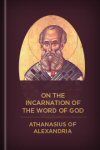
Written just before the rise of Arianism in AD 319, On the Incarnation of the Word of God is the best-known work of Athanasius of Alexandria and a pillar in the doctrine of the Incarnation and the divinity of Jesus. Addressed to a recent Christian convert, this text demonstrates Athanasius’ intellectual acumen and biblical wisdom. This edition contains a scholarly introduction with a thorough outline of Athanasius’ arguments and points. Extensive footnotes draw attention to his references to Scripture, the Greek philosophers, and earlier Christian writings.
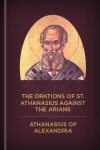
These four orations are the outcome of Athanasius’ extensive theological conflicts with the Arians. In a clear and concise style, Athanasius strenuously opposes the opinions of Arius, while continuing the build up the understanding of Christ’s divinity.
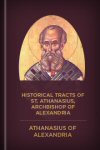
Translated and edited by John Henry Newman, this volume contains the encyclical epistles of Athanasius, written most likely while Athanasius was in exile. With lengthy and well-researched prefatory material and historical and translational notes throughout the letters, this volume is one of the most respected translations on Athanasius to date.
About the Translator
Blessed John Henry Cardinal Newman (February 21, 1801 – August 11, 1890) was a priest and Cardinal in the Roman Catholic Church. His father was a banker and his mother’s family was French Huguenot. Newman was raised in a strict Calvinist home and received his primary education at the famous Ealing School. John Henry Newman graduated from Trinity College, Oxford in 1821 and was elected to a fellowship at Oriel College, Oxford in the following year. On June 13, 1824 he was ordained into the Anglican priesthood. From the early 1830’s until 1845, Newman was a leading figure in the Oxford Movement, a group of Anglican priests and scholars from Oxford who sought to restore the rites of the Anglican church to their Apostolic roots in the Early Church. Between 1842 and 1845, during a time of solitude and the completion of Essay on the Development of Christian Doctrine, Newman underwent a process conversion to Roman Catholicism. Newman also published the Oxford Conservative Journal during this time period as a platform for retracting any negative remarks he previously assailed towards the Roman Church.
He was officially received into the Catholic Church on October 9, 1845. The conversion of John Henry Newman to Catholicism was the result of a life’s long struggle to reconcile the historic faith handed down from the Apostles with his own Anglican tradition. Frustrated with the errors inherent in both Protestantism and Roman Catholicism, Newman abandoned his search for the via media (or, middle way) of Anglicanism and converted to the Roman Catholic Church. In 1848, Newman founded the Birmingham Oratory at Maryvale and began ministering to the Catholic population of the city. In 1851, the Bishops of Ireland elected to start a Catholic university in Dublin and they appointed Newman to be the founder and first rector of the institution. Maintaining his ministry at the Birmingham Oratory, Newman established what would become University College, Dublin. His Idea of a University was prepared for founding faculty of the university at Dublin. On May 12, 1879 Pope Leo XIII appointed Newman to the college of Cardinals. John Henry Cardinal Newman died on August 11, 1890. Cardinal Newman is currently under consideration by the Vatican for sainthood.
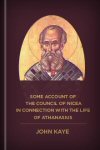
This volume is an exploration of the historical difficulties surrounding the Arian controversy. Taking the accounts of the Council of Nicaea, the four orations of Athanasius against the Arians, and the tract De Incarnatione Christi, the author explores every letter and writing from the same age, piecing together the Council and the issues of Athanasius’ writings. This was the author’s final work, as Dr. John Kaye had just completed this volume before he passed away.
Contents
- Account of the Council of Nicaea
- Account of the Four Orations of Athanasius against the Arians
- Account of the Tract de Incarnatione Christi
John Kaye (1783–1853) was an ordained minister and bishop in the Church of England. He was educated at Sir Charles Burney in Hammersmith, England. He entered Christ’s College at Cambridge and graduated in 1804, later becoming the twenty-first Master of Christ’s College between 1814 and 1830. He became vice-chancellor of Cambridge in 1814 and appointed bishop of Bristol from 1820 to 1827. His final bishopric was at Lincoln from 1827 until his death.
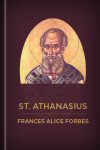
St. Athanasius
- Author: F. A. Forbes
- Series: Standard-bearers of the Faith
- Publisher: R. & T. Washbourne
- Publication Date: 1919
- Pages: 116
This short, enjoyable novelization of Athanasius’ life provides an approachable and quick glimpse into the bishop’s life. Readers of all ages will marvel at the distinct style and clever illustration of his life.
Frances Alice Monica Forbes (1869–1936) was a member of the Society of the Sacred Heart from Scotland and a religious author. Born to a Scottish Presbyterian family, she became Roman Catholic in 1900 and joined the Society of the Sacred Heart a few months later. She wrote numerous biographical works on almost a dozen saints.
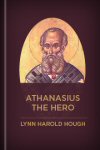
Athanasius the Hero
- Author: Lynn Harold Hough
- Series: Men of the Kingdom
- Publisher: Jennings and Graham
- Publication Date: 1906
- Pages: 174
Lynn H. Hough provides a unique biography of Athanasius, rich with historical facts and keenly aware of the philosophies informing the age. In this volume, Hough establishes the setting around Athanasius, treats Athanasius by his own writings and by the writings of his contemporaries, and brings out the legacy of Athanasius’s work.
Lynn Harold Hough (1877–1971) was a Methodist minister and scholar. He graduated from Drew Theological Seminary with his bachelor of divinity in 1905. He immediately accepted a teaching position at Garrett Biblical Institute, which he served faithfully until he left to serve as president at Northwestern University in 1919. He later accepted a position at Drew University, where he was professor of homiletics and Christian criticism of life, until, in 1934, he was appointed dean. He authored more than 40 books and received no less than 13 degrees—ten of which were honorary. He was one of the most prominent Methodist ministers of the first half of the twentieth century.
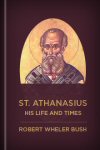
Robert Bush’s biography of Athanasius pays particular attention to the physical world surrounding Athanasius’s life—the archaeological features of Alexandria, the records of the geographical and political state of his world, and the philosophical and theological backdrop to his culture. Thoroughly researched and academically written, St. Athanasius: His Life and Times is a must in the study of the life of Athanasius.
Robert Wheler Bush (1820–1908) was headmaster of Marlborough College at Oxford. He had a BA in classics, an MA from Oxford, and a doctorate in civil law. He was also an ordained clergyman of the Church of England.
Athanasius of Alexandria (ca. 296–373) was the twentieth bishop of Alexandria. Also known as Athanasius the Great, Athanasius is considered a renowned Christian theologian, a Church Father, and a noted Egyptian leader of the fourth century. Venerated by the Roman Catholic Church, the Oriental and Eastern Churches, the Lutheran Church, and the Anglican Communion, he is celebrated with various high-level honorifics across all of these Christian traditions, including “Father of Orthodoxy” in the Eastern Orthodox Church, Doctor of the Church in the Catholic tradition, and “Father of the Canon” among Protestants. He is remembered primarily for his conflict with Arianism—a theological conflict which he spent the majority of his life fighting.
Well educated, Athanasius was familiar with classical Greek philosophy, citing Plato, Aristotle, Homer, and others, and drawing his exegesis primarily from the Septuagint. His main writings, Against the Heathen and The Incarnation of the Word of God, constitute the first developed Orthodox theology. He had an affection toward the monastic lifestyle, demonstrated by his writings (especially his biography of Anthony the Great).
Of Athanasius of Alexandra, it has been said, “To commend him is to commend virtue itself; he was the pattern for bishops, and his doctrine the rule of orthodoxy; he was an eye and a light to the world, the pillar of the faith, and a second John the Baptist.” (Gregory Nazianzen)
Reviews
9 ratings

Gregory Sterner
12/7/2022

Kevin Bratcher
6/12/2018

Denver Race
11/14/2014
Michael Bremner
6/27/2014
AeliusCicero
6/19/2014

Faithlife User
5/2/2014

Larry Proffitt (I
4/29/2014

Doug
4/29/2014
Albert Cooper
4/23/2014